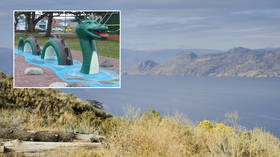Russian aid to Italy, dubbed an ‘influence operation’ by EU-partnered media outfit, is indeed shameful — for Europe
The EU response to Italy's Covid-19 crisis was bungled so shamefully that the bloc apologized as other nations, including Russia, stepped in at Rome's request. Now, journalists are smearing the aid as an “influence operation.”
EU Commission chief Ursula von der Leyen admitted Thursday that “in the face of the need for a common European response” to the pandemic, too many EU countries “thought only of their own” problems. Brussels will now “mobilize alongside Italy,” she said. With nearly 14,000 dead, surely it’s about time.
The decision to put up a united European front came only after Russia had sent doctors, personal protective equipment and 600 ventilators, among other supplies to Italy, which has suffered more Covid-19 cases and deaths than any other country in Europe. China and Cuba also sent critical supplies to help Italy battle the outbreak — and to their credit, some European nations including Germany and France did too, but not before trying to block the export of essential supplies to their neighbors in need in anticipation of domestic shortages. The bottom line is, there was certainly no “united” European response of the kind Italians might have been expecting.
Also on rt.com Solidarity (in)action: EU Commission head apologizes to Italy, pledges €100bn Covid-19 relief fund… which may not happenIn the face of such a disastrous failure, one might have assumed that the ensuing outrage would be directed at Brussels for essentially fiddling while Rome burned. Instead, journalists appear to be more interested in the “optics” of allowing Russian help where European help was absent. They could hardly pass up on the opportunity to dismiss Moscow’s aid as nothing more than a PR stunt and a plot to “undermine” NATO either, now could they?
The latest such effort comes from Coda Story — an outfit which incidentally is so focused on publishing stories about Russia that it has actually (quite comically) had to clarify on its website that it’s “not about Russia” exclusively.
Coda Story’s article came hot on the heels of a story in Italian newspaper La Stampa which claimed that 80 percent of Russian aid was “useless” — a suggestion that was gleefully and widely echoed by Western journalists on social media, but not by Italian officials who spoke publicly themselves. Such a stampede of journalists rushing to brand the Russian supplies as useless might lead readers to judiciously suspect that the anti-Moscow media campaign is an influence operation itself. Meanwhile, if you were wondering, the US has reportedly been hijacking planeloads of supplies headed for Europe by offering larger wads of cash to officials at an airport in Shanghai.
Also on rt.com ‘America First’: Covid-19 exposes cracks in Trans-Atlantic solidarity as US snatches up France-bound masksBut let’s get back to the Russian baddies, shall we? Moscow, Coda goes on, has “seized soft power opportunities” by dispatching supplies to hard-hit nations, while “broadcasting propaganda” through the media. Russia, it says, is carrying out an “unimaginable” influence campaign and using the situation for intelligence gathering to boot.
Let’s not overlook the truly stunning irony of the above claims.
Coda Story is “supported by” European Endowment for Democracy (EED) which itself is a kind of spin-off from the notorious National Endowment for Democracy (NED) across the pond — a soft-power organization which uses buckets of US government cash to pay for pro-US influence campaigns around the world while using cooperative media to pat Washington on the back at every hand’s turn. If Moscow were indeed cynically using a crisis to earn some goodwill inside the EU at a time of crisis — and there is no doubt that offering aid to Italy is a good PR move — it has learned from the very best.
Also on rt.com 'Big mistake': Italy blasts European Commission chief, says Europe needs 'great Marshall Plan' to battle pandemic crisisCoda also tells us that Russia is trying to strengthen “anti-EU feelings” — a feat which Brussels’ inaction has already achieved quite handily (and which can hardly be blamed on Moscow). Indeed, Jacques Delors, a former EU commission president has already spoken about the “mortal danger” the recent lack of solidarity poses to the continued existence of the bloc.
Nathalie Tocci, director of Italy’s Institute for International Affairs, put it well when she told the Guardian that Italian confidence in the EU “depends more on what Europe does than what the Chinese and Russia do.”
Nonetheless, the Coda Story piece seems to have gone down well in anti-Russia think-tank land and has quickly done the rounds on social media. The sight of Russian military experts driving along the autostrada “in broad daylight” should be the “lasting image of Europe's humiliation,” tweeted Euan Graham, a senior fellow for Asia-Pacific security at the International Institute for Strategic Studies.
Whatever 3rd-grade intel they gather in Bergamo, the simple fact of a Russian CBRN unit driving along autostrada in broad daylight should be a lasting image of Europe’s humiliation. https://t.co/KmKddcbbJT
— Euan Graham (@graham_euan) April 3, 2020
Finally, Coda Story takes issue with Russian media “amplifying” its government's efforts to help Italy through a crisis of historic proportions. This too is highly ironic, given that Western media journalists regularly act as cheerleaders for their government’s endeavors abroad, no matter how questionable they might be.
The reaction from journalists and think-tankers who are wholly committed to West-approved narratives only has been depressingly predictable. Why focus on your own failings, when you can spin them into an opportunity to hammer Russia instead?
It’s not the sight of Russian military experts “charging around Italy” (as one former NATO official put it) that is shameful, it’s the fact that the EU’s inaction created the need for it in the first place.
Like this story? Share it with a friend!
The statements, views and opinions expressed in this column are solely those of the author and do not necessarily represent those of RT.















